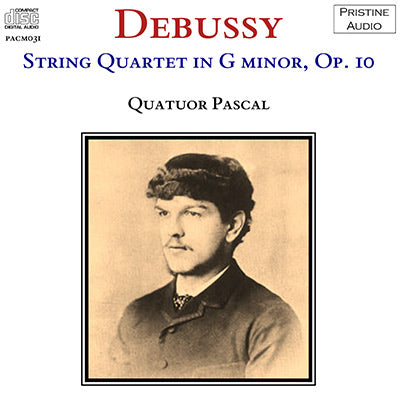
This album is included in the following sets:
This set contains the following albums:
- Producer's Note
- Full Track Listing
- Cover Art
A Wonderful Debussy Quartet Performance
The Quatour Pascal, remastered for finest sound quality
Debussy's String Quartet was among his earliest major composition. Premièred in 1893, it shows many indications of what was to come with its use of modal and whole-tone scales, and radical harmony. Although often recorded, there can be few interpretations as vivid as this one - looking back over our correspondence since Peter first started working on it, I found an e-mail from him which read (in part): "I ABSOLUTELY LOVE THIS PERFORMANCE. Just ecoutez to the violin tone in the selected passage, par example. Incroyable. How did he do it?"
With this in mind I asked Peter to elaborate for this page:
"Andrew recalls that when I first played this LP, I wrote him ecstatic e-mails declaring that we had to re-issue this at all costs!
Reasonably enough, he asks: Why?
Of course I already knew the Debussy quartet well, on recordings it is coupled almost inevitably with the Ravel quartet as if they were two sides of the same coin which - in my view - they most definitely are not. But here was an astonishing recording stretching back halfway to the date of composition, in a playing style - the use of rubato and portamento, for example - which I think no ensemble would attempt today. For the first time I somehow felt I was listening to a performance that reflected what Debussy intended. And one where the four players - unusually - were in complete accord over what those intentions were and how they should be realised.
This reading by the Pascal Quartet is therefore both stylistically and technically highly satisying, but for me what makes it so special is that it is also intensely evocative: within the first five minutes memories come unbidden - almost tangible - of the languid waters of the Loire drifiting by on a perfect Summer's day; a glass of chilled wine, the condensation slowly running down the glass; the glow of the soft skin of a beautiful girl; time standing still - the moment preserved eternally. A Monet painting in music. Each movement has its own character and its own power to evoke, and what you will find will be yours alone. I just know that of the six or seven other recordings that I have of the Debussy Quartet this, by the Pascals, is the one that I will choose to return to."
Andrew Rose & Peter Harrison
-
DEBUSSY String Quartet in G minor, Op. 10
Originally released circa 1952 on Guilde International du Disque LP MMS-53
Believed to be a transcription of an earlier recording, c.1948
Duration 25:50
Quatour Pascal:
Jacques Dumont, violin
Maurice Crut, violin
Léon Pascal, viola
Robert Salles, cello
Bill Rosen's Review
Buy it for the revelatory first three movements and the splendid sound
The Debussy String Quartet, married eternally to the Ravel, has always been deemed a last early Debussy work, rather a goodbye to his Massenet period and a kin of works like Printemps and La Demoiselle Elue. In this magnificent performance of iron elegance, the Pascal quartet show that it points rather to La Mer and Gigues Triste.
In the first movement, the chordal theme is thrown out with terrific propulsion by the Pascal. These are gray skies--Pelleas and Nuages--and the Pascal yield very little until the lyric second theme which is slightly ritenu, but of very little caloric content. The rest of the movement is velvet and steel. In the second movement, the pizzicati are there, but not omnipresent. The melody floats but is very lean.
The third movement is austere and oppressed. Not sweetness but gravitas. The middle section brings some relief. Toward the end there is heart-easing warmth.
In a letter of July 2, 1893 to Ernest Chausson, Debussy recounts his difficulties with the finale of the quartet: "I can't get it into the shape I want, and that's the third time of trying." Well, it's clear he never made it. The finale has got a good coda and not much else. The Pascal strive mightly to minimize its chaos and rhetoric, but somehow their very greatness in the first three movements make things worse.
Buy it for the revelatory first three movements and the splendid sound.

